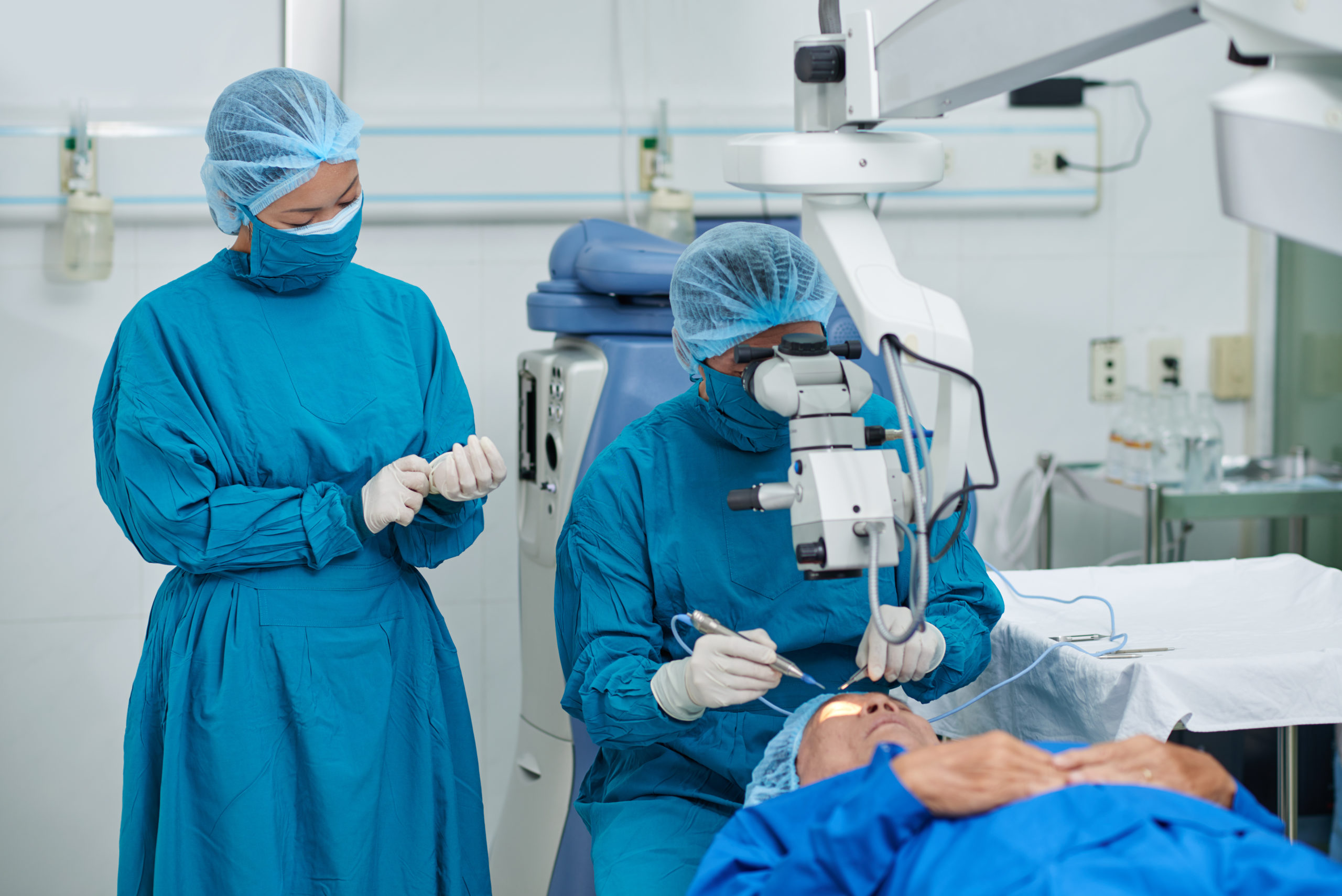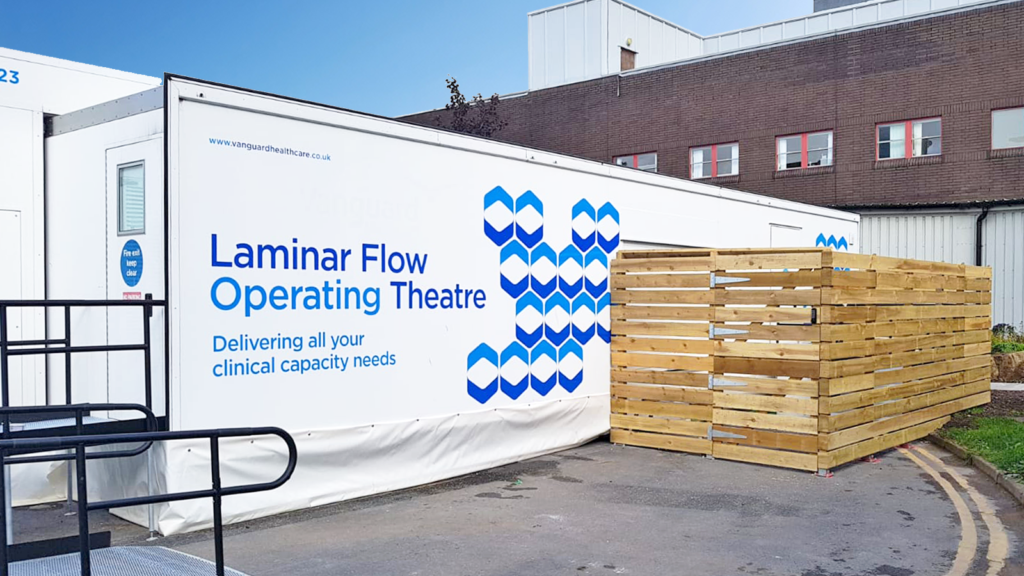Rethinking cataract service provision

Steve Peak, Delivery and Development Director for Vangaurd Healthcare Solutions, outlines how the NHS can meet the rising demand for cataract services.
With demand set to double by 2035, keeping on top of waiting lists for cataract surgery should be a key priority for the health sector. Cataract surgery is the most performed surgical procedure in the country, with 400,000 procedures taking place in the UK each year, but Covid-19 has disrupted services across the country.
Despite incredibly stretched resources, several trusts have acted to ensure cataract surgery could continue during the pandemic. The cataract team at Stoke Mandeville Hospital, a part of Buckinghamshire Healthcare NHS Trust, is an excellent example. The team, led by Consultant Ophthalmologists Mike Adams and Sarah Maling, has rapidly adapted to unique pressures to continue service and have performed more than 3,000 cataract procedures since the first lockdown was announced a year ago.
Demand only going in one direction
The Royal College of Ophthalmologists predicts that demand for cataract services will rise by as much as 25 per cent over the next 10 years. The drivers for this are many, including an ageing population, better surgical techniques, and increasing availability of cataract procedures.
Patient expectations for cataract procedures are also rising, and rightly so. People are now more physically and socially active in later life than previous generations and regularly use digital screens. A higher proportion of older people also drive than in previous years. “Demand was already high,” says Dr Adams, “but it has only increased due to the pandemic.” With almost all professional and social interactions moving online during lockdown, Dr Adams says that people are much more aware of vision problems than they were before.
Lulls in demand during the first and second lockdowns were largely due to a reduction in referrals, as access to opticians was limited. Opticians are now open again but Dr Adams suggests many patients are still nervous and opting to wait. This could create a surge in demand three months’ time, when the majority of over-70s will have received their second vaccine dose. “There is definitely a need to scale up capacity in the UK to meet increasing demand,” he stresses.
Cataract surgery saves sight
The number of cataract removals performed has risen over the past decade, but figures from NHS Digital show that the rate of increase has slowed since 2016/17. Further, waiting times are rising, with some patients waiting up to seven months prior to Covid-19.
Although considered a non-urgent procedure, delayed cataract procedures can lead to adverse health outcomes. As Dr Adams says: “Having poor vision means being more likely to have a fall and end up in hospital. For very frail patients a fracture is a significant event, which can be associated with higher mortality.
“Being able to see also means the patient is able to look after other medical problems more efficiently – and better vision can also improve mental health.” Further, poor vision can limit social contact in an era defined by social isolation. So, cataract surgery is really important for both physical health and mental health.
“In terms of overall benefit for the NHS,” Dr Adams says, “cataract surgery is the one intervention that is going to make the biggest difference to people’s health for the least amount of money.”
Rethinking cataract surgery delivery
Additional capacity can be released by improving effectiveness in existing theatres, fitting in more patients or working longer hours, but during Covid-19, that has been difficult to achieve.
In The Way Forward, the Royal College of Ophthalmologists suggests mapping current pathways, auditing cataract referrals and creating a programme of change to improve the cataract service. At Stoke Mandeville Hospital, the team has done just that and it has meant they were one of the first NHS units in England to restart elective cataract surgery.
The team restarted cataract surgery in mid-May and haven’t stopped since and are now being sent referrals from other trusts that are still not able to operate. This is proving to be massively beneficical for neighbouring trusts and the local ICS network.
In Mike’s mind, the reason they have been able to carry on through the pandemic goes back to a decision made as an eye department back in 2018 – to treat cataract surgery as a sub-specialty in its own right.
“The first thing we did was to sit down and figure out our cataract demand and our cataract capacity,” says Mike, “and we very quickly figured out that one didn’t meet the other.” Having visited the dedicated Vanguard unit at the Golden Jubilee Hospital, the team launched a 12-week pilot project in spring 2019, and performed 1,000 cataracts in 12 weeks.
“In November last year, we also performed 450 cataract operations in two weeks in our internal theatres, in the middle of Covid-19. When our new Vanguard unit arrived, we had all the protocols in place and just transferred all that across. Since December, we have been doing around 80-100 cases a week in the Vanguard unit.
“Having a standalone unit has allowed us to prioritise more complex cases that require additional support in our main eye unit within the hospital. This meant we could also treat patients with communication difficulties or mild dementia, ensuring they are not been left behind.”
Dealing with changes in demand
The first operation in the Vanguard unit at Stoke Mandeville Hospital took place in November and the Trust’s aim was to work through its cataract surgery waiting list within a year.
“About two years ago, we had over 1,000 patients waiting more than 12 weeks for surgery,” says Mike. “If someone gets referred to Stoke Mandeville today for their cataract surgery, they will get their operation within 16 weeks. So, the project has changed the whole pathway.”
The success has been down to the wider efforts to reconfigure the delivery of cataract services across Buckinghamshire, which has involved a multi-disciplinary team assembled from across the hospital and the CCG, but also in part to the introduction of flexible infrastructure.
One of the main benefits of having a standalone theatre has been a substantial reduction in turnaround times. Because of the work the Trust had done on the pathways and the streaming of patients, it could dramatically increase efficiency and throughput in the theatre, and reduce the amount of downtime between procedures to just a couple of minutes.

A dedicated space for cataract surgery
The standalone theatre at Stoke Mandeville provides a complete facility for cataract procedures, consisting of a mobile laminar flow theatre with a procedure preparation room and recovery bays, connected to a modular clinic with a reception and patient waiting area.
Sarah Maling, joint lead for the Trust’s cataract service, says: “Our Trust is well known for delivering an excellent cataract service and the project has been a great success. Patients love the Vanguard unit too; we have even had requests directly from patients to be treated in the new theatre.”
Mike continues: “The current set-up we have is a Vanguard unit with a modular unit on the front as a clinic area. When you’re inside it, you wouldn’t know you weren’t in a hospital – it has been finished to a really high standard.
“It is nice for the surgeon and it’s nice for the patients. Patients like it because it is clean and hasn’t been used for anything else, and they know all staff have been tested and vaccinated. Even those patients that are a bit nervous about Covid are happy to come to the Vanguard unit because it’s separate to the main hospital.”
The operating theatre was designed by Vanguard and Alcon in close collaboration with the Trust’s ophthalmology team.
Meeting demand in the longer term
Longer waiting times in combination with steadily growing demand have led to an increasing number of patients being treated privately. In 2017/18, almost one in five NHS-funded cataract procedures in England were done in the private sector, a figure likely to have increased during the pandemic.
But while outsourcing to the private sector is an option, retaining the service within the NHS by bringing a dedicated theatre to the hospital site means greater control and increased flexibility. There are other benefits too, as Mike points out.
“There are two parts to meeting the increased demand. Increasing capacity is really important, but that’s only half the story, because we need to make sure that we also have surgeons who can do the surgery in five to 10 years’ time. Sending cataract surgery off to private providers means a lot of money going out of the NHS, and it means either poor quality or no training for our registrars.
“So it’s a really important balance,” Mike adds. “The NHS has absolutely got to increase capacity but has to do that in such a way that ensures enough money stays in the system to fund the eye department and also fund training of the next generation of surgeons.
“One solution would be to set up a larger cataract hub to provide high-volume surgery across the wider region, while complex cases and patients who need more support are catered for in existing local units. Such a solution would allow the Trust to fine-tune both their training and its service provision.”
A combination of mobile theatres and modular buildings provides an ideal solution for increasing capacity in the short term – or for piloting the set-up of a dedicated hub or high-volume surgery centre to increase capacity in the longer term.
